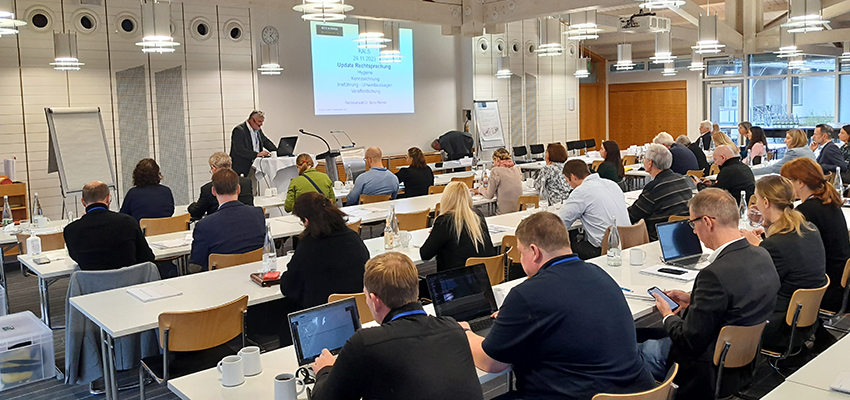After the enforced "Corona" break, the conference took place again this year on 23 and 24 November as a face-to-face event in Karlsruhe.
In addition to food safety, this year's lecture series focussed on the topic of sustainability on the second day of the seminar. The organisers were able to attract some top-class speakers, first and foremost Prof. Klaus-Dieter Jany as conference president. He was long-standing director of the Max Rubener Institute and still is a scientific advisor to the German government and the EU Commission on "New Genetic Engineering". Prof Jany had also been awarded the "" a few days earlier .
The symposium was chaired by Dr Gerd Fricke, Vice President of the BVL (Federal Office of Consumer Protection and Food Safety).
In the topic area of "Food safety", the focus of the presentations was on microbiological risks and how to minimise them. A topic that does not appear new and exciting at first glance, but is still and will continue to be one of the highest risks in the context of HACCP requirements in food processing companies. Listeria and Campylobacter infections are at the top of the list of European alerts and public product recalls. Yersinia as a food pathogen is also increasingly coming into focus.
Following the German Supply Chain Duty of Care Act (LkSG), the implementation of which is causing headaches for many smaller companies - and not just in the food industry - a new global standard is emerging. The "new" (Sedex Members Ethical Trade Audit) raises the bar even higher and also checks compliance with and continuous improvement of social and ethical standards within supply chains. A medium-sized company that wants to remain in business as a supplier to a member will have to deal with far more complex documentation obligations than those currently required by the LkSG.
SMETA was presented by Helmut Roike from Qualisa Consult in his contribution and left most of the participants with thoughtful mines.
The presentation by Prof Hans-Curt Flemming on biofilms was not only characterised by its extremely entertaining presentation style, but also covered a wide range of topics from the beginnings of life on our planet, which could not have developed without "the perfect slime" (title of his to modern process engineering, for which biofilms represent a permanent hygienic challenge.
Another highlight of the symposium was the concluding presentation by Andreas Witsch on strategic allergen management from the perspective of a mid-sized food manufacturer. Using practical examples, he explained how risks can be systematically identified and realistically assessed with the help of simple rule-of-three calculations in order to derive sensible and effective measures for food safety. At the end, he even offered interested parties a free download of an Excel tool he had developed. Contact me, I will be happy to pass on your request.
YOUR PLUS: We regularly take part in specialist symposia and look a little beyond the "analytical horizon". In discussions on the fringes of such events, we establish and deepen our professional network and receive valuable suggestions for the further development of our services.
Author: Dr Frank Mörsberger

 Contact
Contact

 Contact
Contact Career
Career